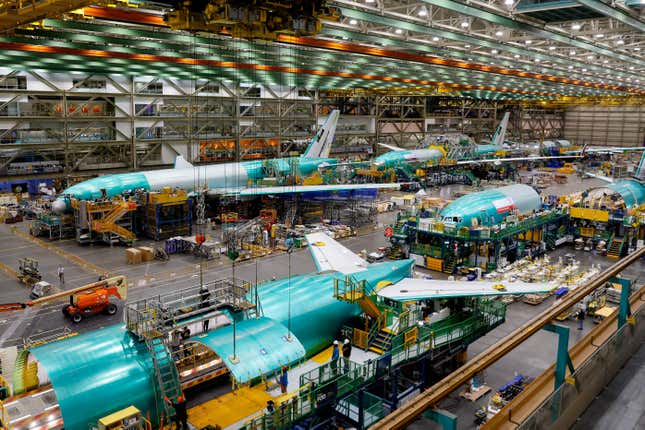
In This Story
The nearly two-month-long machinists’ strike at Boeing (BA-0.01%) had a big immediate effect on both the planemaker’s bottom line and the economy at large, but the work stoppage will have a long-tail ripple effect. The research firm Oxford Economics noted that aviation manufacturing was a big reason for the 0.1% advance in industrial output that was lower than market expectations.
“We thought aerospace production would have shown some improvement thanks to the conclusion of the seven-week machinist strike at Boeing,” the Oxford analysts wrote in a research note to clients. “However, aerospace output fell 2.6% in November after tumbling by 8% and 6.7% in September and October, respectively.”
Boeing workers walked off the job while negotiating a new labor contract. They got the company to sweeten its offer from a 25% raise to a 38% raise by the time Boeing put forward a contract that members of the International Association of Machinists and Aerospace Workers felt comfortable ratifying.
Besides the lost output from shut-down Boeing airliner production lines (and massive layoffs), the company’s suppliers also had to recalibrate their operations because parts they manufactured didn’t have anywhere to go. Stephen Oswald, the CEO of engine parts maker Ducommun (DCO-1.10%), recently pointed out how that looks at Spirit AeroSystems (SPR-0.44%), the embattled fuselage manufacturer for Boeing’s 737 Max planes.
“If you go to Wichita, you look at Spirit, and you look at all the fuselages that are stacked up, there used to be like 90 of them maybe,” Oswald said on a recent earnings call. “Now, it is like 150 fuselages.”
(Boeing, which is acquiring Spirit, had to dole out a huge rescue package to the Kansas company in order to help it stay afloat.)
Boeing just restarted production on the 737 Max, but it will take a while for things to get back up to speed, not to mention Boeing’s other strike-affected planes that it also has to get back to building, such as the 767 and 777 models.
“We still look for aerospace output to claw back lost ground in the next months, but as the November numbers underscore, it will be a slog,” the Oxford note says.